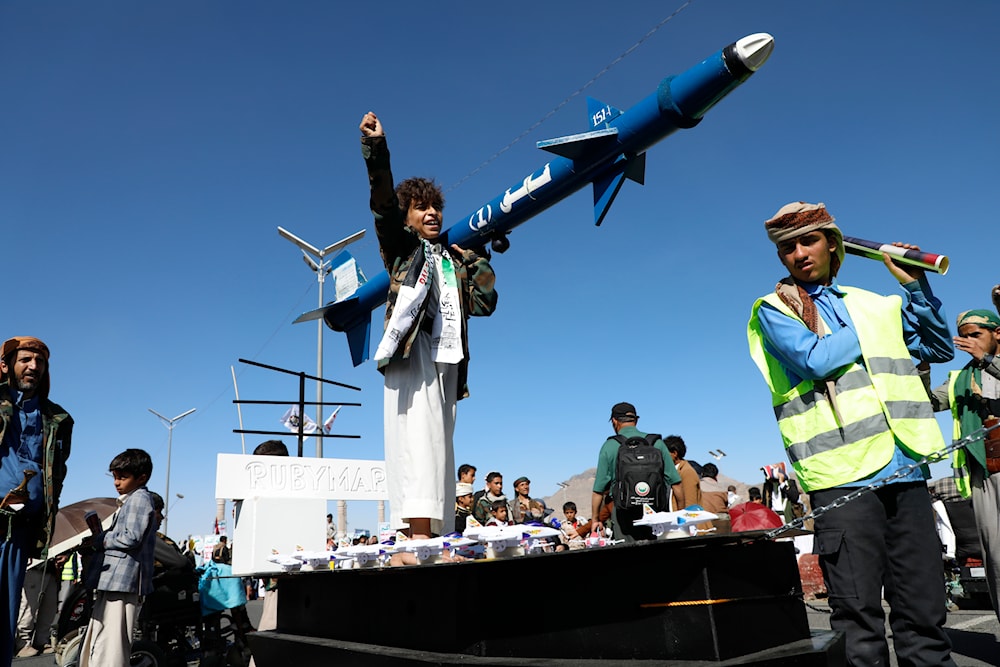US fails in repelling Yemeni operations due lack of intel: FT
Even though the Pentagon claims that Yemen's military tactics and capabilities have been destroyed following weeks of missile strikes against it, damage data remains unclear.
-

Yemenis attend a rally against the US-led strikes on Yemen and "Israel's" war on Gaza, in Sanaa, Yemen, Friday, Feb. 23, 2024. (AP)
Quoting both current and former American officials, the Financial Times reported that the reason why the US military has been failing at stopping Yemen's operations in the Red Sea is the lack of intelligence about Yemen's arsenal and full capabilities.
Even though the Pentagon claims that Yemen's military tactics and capabilities have been destroyed following weeks of missile strikes against it, forcing the Yemenis to change tactics, damage data remains unclear because the US did not have enough assessment of the country's capabilities before launching its strikes, let alone measuring the damage inflicted on them.
The Pentagon’s top official on the Middle East, Dan Shapiro, told a congressional hearing last week that despite the US having “a good sense” of what it targeted, it did not “fully know the denominator."
Shapiro’s remarks in public mirror much of the concern expressed by senior US officials in private regarding the lack of intelligence and the ability to paint a full picture, which is hindering the Pentagon’s assessment of what Yemen's capabilities truly are.
For an extended period, the resourceful Ansar Allah proved adept at troubling American allies in the Middle East to the extent that Pentagon strategists began emulating some of their tactics.
That’s the take offered by Helene Cooper, a Pentagon correspondent for The New York Times, and Eric Schmitt, a national security correspondent for The New York Times.
Highlighting Ansar Allah's success in repurposing readily available commercial radar systems from boating stores and enhancing their portability, a senior US commander tasked Marines with devising a comparable solution. By September 2022, Marines in the Baltic Sea were implementing mobile radar systems inspired by the ingenuity of Ansar Allah.
Read more: Ex-UN envoy to Yemen tied to MI6, SIS, Foreign Office: Declassified
Admitting mistakes
President Joe Biden's administration is facing challenges in halting the ongoing operations of the Yemeni Armed Forces (YAF) in the Red Sea, and the YAF are persistently reinforcing their weapons stockpile, despite US forces delivering multiple strikes against multiple targets in Yemen, CNN reported citing US officials, last month.
The report pointed out that US officials are struggling to devise an effective strategy against the YAF, as some within the Biden administration argue that relying solely on the use of force is proving ineffective.
Additionally, it is deemed expensive and impractical to continue launching multimillion-dollar missiles at relatively inexpensive YAF drones and rockets, CNN suggested.
The news website cited several officials as saying that the US lacks a clear assessment of the percentage of YAF equipment destroyed during strikes on Yemen, making it uncertain whether the military approach will undergo further changes.
"We just don’t have a good idea of what they [YAF] still have," a senior defense official told CNN, adding, "They continue to surprise us."
Even Pentagon Press Secretary Major General Pat Ryder claimed that US-led strikes on Yemen had "degraded" the Yemeni forces' ability to carry out operations in the Red Sea, but he acknowledged that the US attempt to deter the Yemeni Ansar Allah movement has not succeeded so far.

 3 Min Read
3 Min Read








